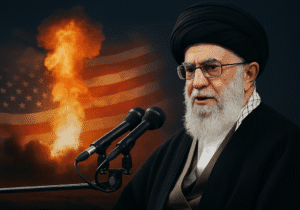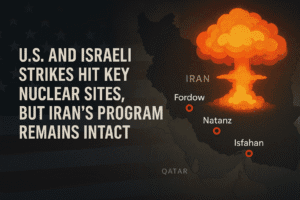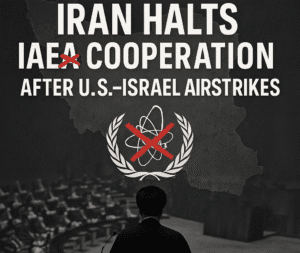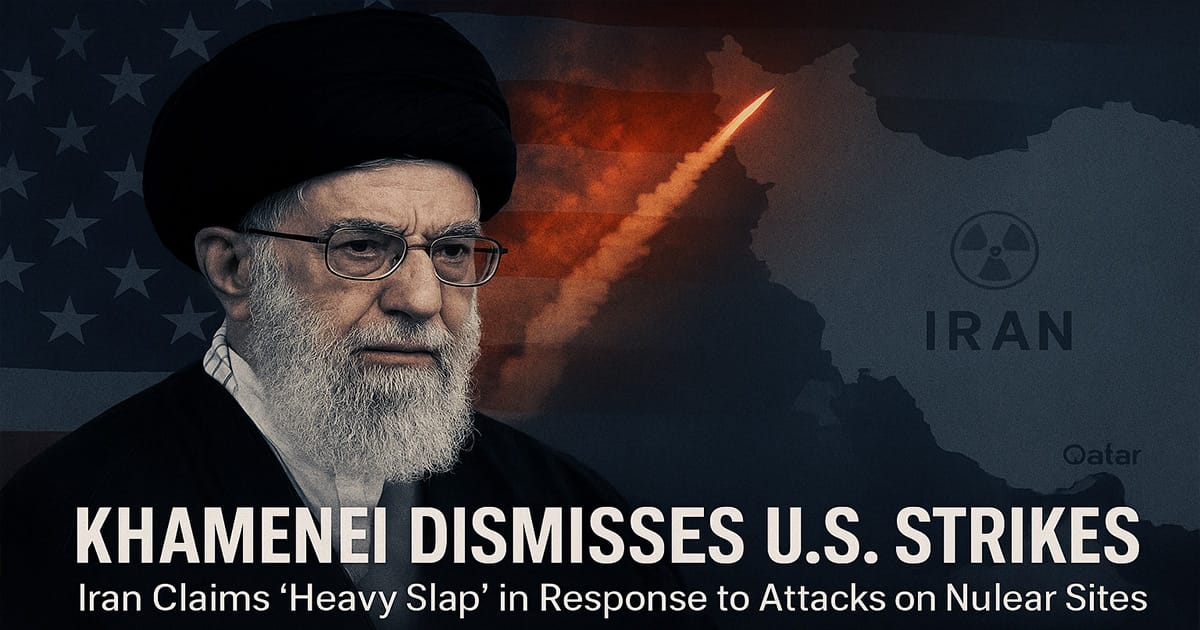Khamenei Dismisses U.S. Strikes, Claims No Major Nuclear Damage
Iran’s Supreme Leader Ayatollah Ali Khamenei has downplayed the impact of recent U.S. airstrikes, asserting they caused no significant damage to the country’s nuclear infrastructure. In his first remarks since a temporary ceasefire ended 12 days of regional conflict, Khamenei accused the United States of exaggerating the operation’s success. He asserted that Iran issued a strong response by targeting U.S. military positions in the region, sending a clear message of resolve and preparedness. Dismissing American narratives as misleading, the Supreme Leader emphasized that Iran’s nuclear capabilities remain intact and the nation remains resolute in the face of foreign aggression. Khamenei Dismisses U.S. Strikes.
Iran Claims Missile Strike on U.S. Base Was a ‘Heavy Slap’ in Retaliation
Iran’s Supreme Leader Ayatollah Ali Khamenei, during a firm and unapologetic speech, declared that Iran had dealt a “heavy slap” to the United States in retaliation for recent airstrikes targeting its nuclear facilities. Delivering his first public comments since the ceasefire agreement, Khamenei characterized the missile strike on the U.S. Al-Udeid Air Base in Qatar as a deliberate and strategic act of resistance, aimed at demonstrating Iran’s military readiness and political resolve.
He described the attack as a powerful message that Iran would not tolerate acts of aggression and is fully prepared to respond with force. Khamenei emphasized that Iran’s response was measured but impactful, intended to deter future military actions by Washington. He also criticized U.S. leaders for misrepresenting the damage inflicted on Iran, asserting that the country’s nuclear infrastructure remains largely intact. Iranian state outlets portrayed the missile operation as a success, claiming it demonstrated Iran’s capability to strike high-value foreign targets with precision.
The remarks come as tensions remain high in the region, with international observers warning that continued escalation could destabilize broader Middle East security dynamics. Tehran, however, signaled it would not strike first unless provoked again.


Khamenei Accuses Trump of Lying About Success of U.S. Strikes
In a sharp rebuke, Iran’s Supreme Leader Ayatollah Ali Khamenei accused former U.S. President Donald Trump of exaggerating the success of recent American airstrikes on Iranian nuclear sites. Speaking during a televised address following the ceasefire, Khamenei claimed that Trump had “lied in unusual ways” to portray the operation as a decisive blow to Iran’s nuclear program. He stated that the damage inflicted was minor and had no real impact on Iran’s core capabilities. According to Khamenei, the United States sought to use media narratives to mask what he called a failed and desperate attempt to weaken Iran. Khamenei Dismisses U.S. Strikes, asserting that such actions only strengthened Iran’s resolve and exposed Washington’s propaganda.
U.S. and Israeli Strikes Hit Key Nuclear Sites, But Iran’s Program Remains Intact
According to U.S. and Israeli intelligence sources, the recent airstrikes targeted key Iranian nuclear facilities, including Fordow, Natanz, and Isfahan. These sites, known for their uranium enrichment capabilities, reportedly suffered structural damage, disrupting some operations temporarily. However, officials from both nations acknowledged that the strikes did not completely cripple Iran’s nuclear program. While centrifuges and support infrastructure may have been affected, Iran retains enough technical capacity and resources to resume its activities within months. Satellite imagery and classified assessments suggest that deeper underground portions of these facilities remain operational or repairable.
Analysts view the strikes as a strategic setback for Iran, but not a decisive blow. The partial damage indicates a calibrated operation, possibly aimed at sending a warning rather than initiating full-scale conflict. Iran, meanwhile, has maintained that its core nuclear capabilities remain intact and will be restored swiftly if necessary.


U.S. and Israeli Strikes Damage Iranian Nuclear Sites, But Core Program Survives
U.S. and Israeli strikes recently targeted key Iranian nuclear sites, including Fordow, Natanz, and Isfahan, causing structural damage and temporarily disrupting operations. Intelligence sources indicate that while some centrifuges and infrastructure were affected, Iran’s core nuclear capabilities remain largely intact. Analysts believe the attack was a strategic message rather than an attempt to completely dismantle Iran’s program. In response, Supreme Leader Ayatollah Ali Khamenei claimed the damage was minimal and accused Washington of exaggeration. Khamenei Dismisses U.S. Strikes, stating they failed to achieve any meaningful objective and only strengthened Iran’s resolve to continue its nuclear efforts confidently.
Iran Suspends Cooperation with IAEA After Airstrikes on Nuclear Sites
Following the joint U.S. and Israeli attacks on its nuclear infrastructure, Iran’s parliament approved a motion to halt collaboration with the International Atomic Energy Agency (IAEA). Lawmakers cited the airstrikes as a violation of international norms and declared that continued transparency with Western-led institutions was no longer in Iran’s national interest. The decision marks a significant shift in Iran’s nuclear diplomacy, potentially limiting the IAEA’s ability to monitor enrichment activities and facility access. Hardline members of parliament applauded the move, calling it a necessary response to foreign aggression.
However, analysts caution that cutting off IAEA oversight may heighten regional tensions and push Iran toward deeper diplomatic isolation on the global stage. The IAEA has not yet officially responded but expressed concern over reduced access. The situation remains highly volatile.


Iran–Israel Conflict Ends in Fragile Ceasefire Brokered by U.S.
The statements from Iran’s leadership come just days after a 12-day war between Iran and Israel that involved heavy missile exchanges and heightened regional tensions. The conflict concluded with a fragile, temporary ceasefire brokered by the United States. While the truce brought a brief pause in hostilities, rhetoric from both sides has remained combative. In this context, Iran’s Supreme Leader Ayatollah Ali Khamenei criticized Washington’s actions and narratives, asserting that the U.S. failed to inflict meaningful damage. Khamenei Dismisses U.S. Strikes, framing them as ineffective and warning of potential retaliation if provoked again.
You might also like
Join our official WhatsApp Channel RealSource24 for breaking news, trending headlines, and real-time alerts — all in one place!👉 Click here to Join Now
